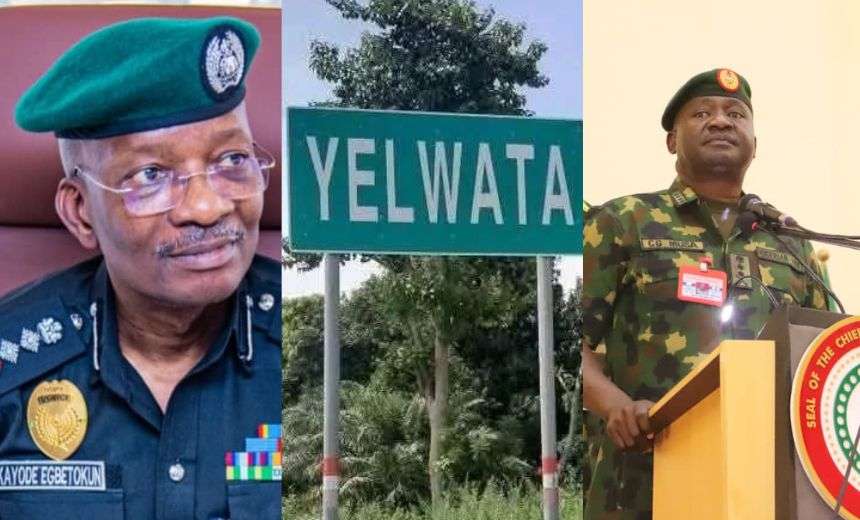On the night of June 13, 2025, a devastating attack in Yelewata, Guma Local Government Area of Benue State, left approximately 200 villagers dead, prompting a swift response from Nigeria’s security forces. The Nigerian military and police have launched a joint, cross-border manhunt to apprehend the gunmen responsible for the massacre, which targeted a farming community, including internally displaced persons (IDPs). The operation, led by Chief of Defence Staff General Christopher Musa and Inspector-General of Police Kayode Egbetokun, seeks to bring the perpetrators to justice and address the escalating violence in the region.
The assailants, suspected to be heavily armed herders, struck Yelewata with unprecedented brutality, setting homes ablaze and killing indiscriminately, including women, children and the elderly. Eyewitnesses reported that the attackers operated with military precision, using automatic weapons and incendiary devices to destroy houses, farmlands and livestock, leaving the community in ruins. The attack, one of the deadliest in Benue State’s recent history, has displaced hundreds more, exacerbating the region’s ongoing humanitarian crisis.
General Musa, addressing the press in Abuja, described the attack as a “heinous act of terrorism” and emphasized the military’s commitment to adapting its strategies to counter such threats. He highlighted the need for enhanced intelligence gathering and community collaboration to prevent future attacks, noting suspicions of insider involvement that may have facilitated the assault. The operation extends beyond Nigeria’s borders, as intelligence suggests the gunmen may have fled to neighboring regions, necessitating cooperation with regional security forces.
The Inspector-General of Police, Kayode Egbetokun, confirmed the deployment of additional police units to support the manhunt, including tactical teams specialized in counter-terrorism and cross-border operations. These units are working alongside military personnel to track the perpetrators, with checkpoints established along major routes in Benue and neighboring states. Egbetokun also announced plans to increase police presence in vulnerable communities to restore public confidence and deter further attacks.
Benue State Governor Rev. Fr. Hyacinth Alia condemned the attack as “barbaric” and visited the affected community to assess the damage and provide relief materials to survivors. He disclosed that over 150 bodies had been recovered by June 15, with search efforts ongoing for missing persons, and called for federal support to bolster security in the state. The governor also urged residents to remain vigilant and report suspicious activities to security agencies to aid the ongoing operation.
The Nigeria Governors Forum, in a statement, expressed solidarity with Benue State and condemned the attack as an assault on the nation’s collective security. President Bola Tinubu, reacting to the incident, vowed that his administration would ensure justice for the victims and work tirelessly to restore peace in the region. He directed the military and police to intensify efforts to dismantle criminal networks operating in the North Central zone, promising additional resources to support the manhunt.
Preliminary investigations suggest the attack may be linked to ongoing farmer-herder conflicts, which have plagued Benue State for decades, fueled by competition over land and resources. Security analysts note that the sophistication of the attack, including the use of advanced weaponry, raises concerns about the proliferation of arms in the region and potential external backing for the assailants. The military has pledged to investigate these angles while prioritizing the immediate capture of the perpetrators.
Humanitarian organizations have begun mobilizing to provide aid to the survivors, many of whom are now sheltered in makeshift camps in nearby towns. The United Nations Office for the Coordination of Humanitarian Affairs (OCHA) reported that over 500 families were displaced, with urgent needs for food, medical supplies, and shelter. Local NGOs have called for increased protection for IDP camps, which remain vulnerable to similar attacks.
The joint operation has garnered mixed reactions from the public, with some residents expressing hope that the coordinated effort will yield results, while others remain skeptical due to past failures to curb violence in the region. Community leaders in Guma have appealed for dialogue between farmers and herders to address the root causes of the conflict, alongside the ongoing security measures. However, the immediate focus remains on apprehending the gunmen and preventing further loss of life.
The attack has reignited national debates on Nigeria’s security challenges, with calls for comprehensive reforms to address systemic issues such as inadequate funding for security forces and weak intelligence networks. General Musa reiterated the military’s determination to adapt to evolving threats, including through the use of technology such as drones for surveillance. The success of the manhunt, he stressed, depends on the cooperation of all stakeholders, including local communities and international partners.
As the operation continues, security forces have urged residents to remain calm and avoid taking the law into their own hands. The military and police have established hotlines for reporting tips on the whereabouts of the suspects, emphasizing the importance of public participation in the fight against insecurity. Updates on the manhunt are expected as the operation progresses, with authorities vowing to leave no stone unturned in their pursuit of justice for the Yelewata victims.




